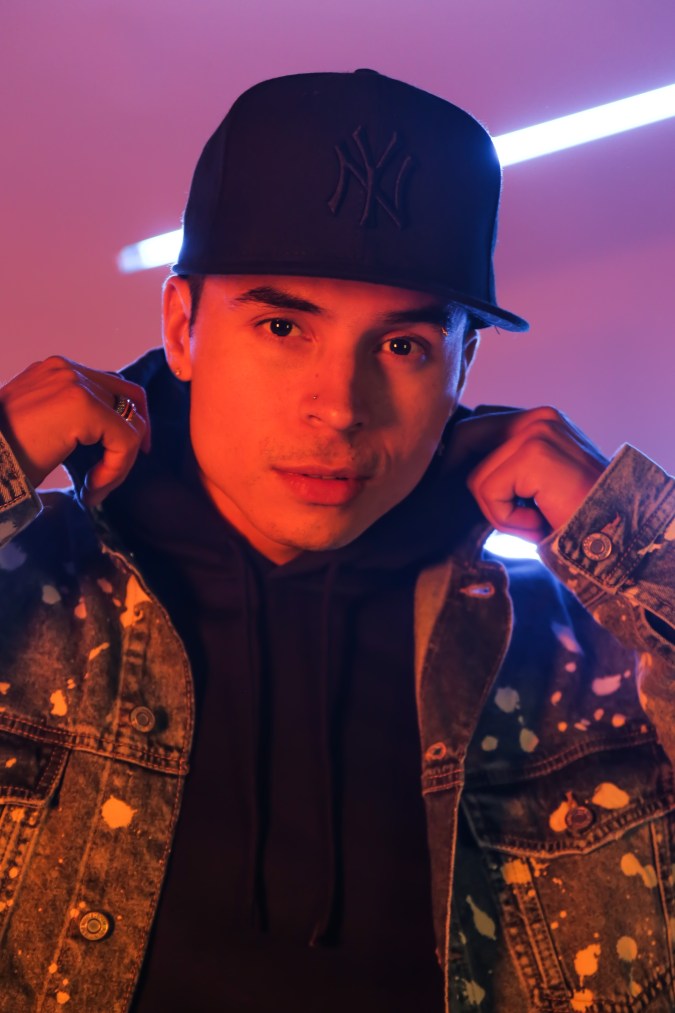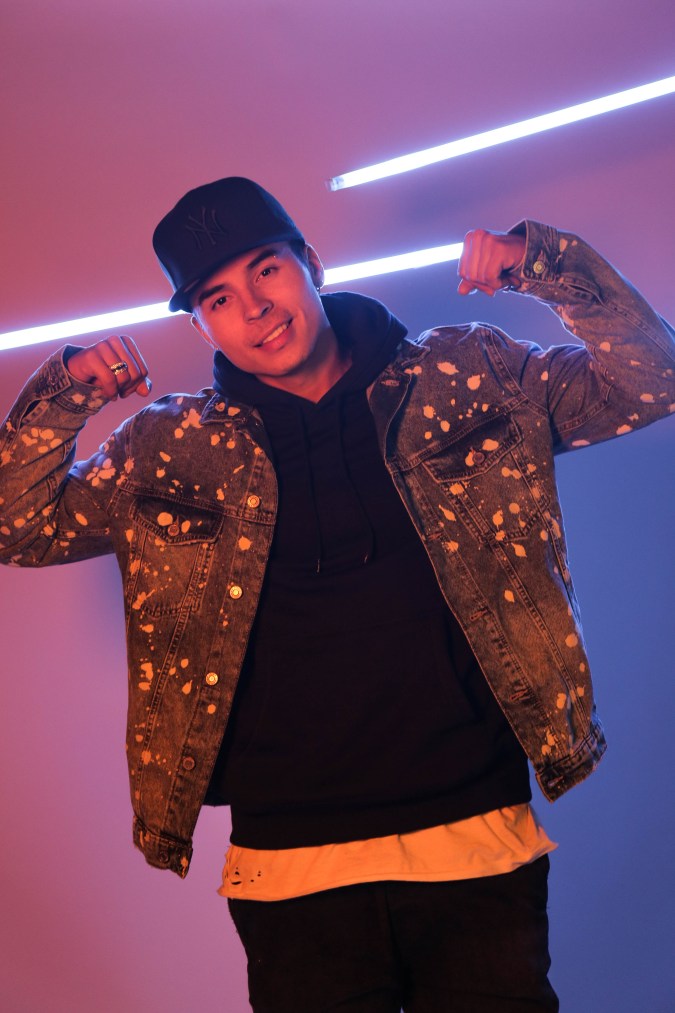Born Andrés Felipe Robledo Londoño in the Envigado neighborhood that he still proudly represents, Reykon came from humble beginnings. After starting to make music with a mic, a cassette player, and recorder he borrowed from his mother, he eventually moved on to working out of a FL Studio-powered studio opened by local urbano duo Golpe a Golpe, who now have feature credits alongside Justin Quiles, J Balvin, Yaga y Mackie, and De La Ghetto.
But this shift towards a homegrown aesthetic didn’t always precede demand for the sound. in the earliest days, Rekyon recalls that “it was rough. People didn’t believe in Colombian reggaetón; there was a lot of ridicule, they laughed at us; it was a tough beginning but through that is why we’re here now.”

Over the course of a decade, Reykon “El Líder” has gone from being a scene-level pioneer of Medellín’s pop reggaetón wave to a major label artist signed to Warner Music Latina. For the Colombian-born singer, this evolution hinges on a steady recording grind as much as a commitment to reconsider the U.S. crossover as the ultimate indicator of success. Reykon emerged from his home city’s scene alongside contemporaries J Balvin and Maluma, and was quick to reach beyond his immediate surroundings, locking in collaborations with Daddy Yankee and Zion & Lennox in the earlier days of Puerto Rico and Colombia’s cross-continental collaborative network. Having amassed numbers in the millions across platforms, Reykon’s strategy showcases something markedly different from his peers – a valuation of Latin American audiences on equal footing with listeners from the U.S., suggesting a shift away from the conventional centralization of the market.
Londoño emerged at a time when his local scene’s producers attempted to replicate or approximate the style circulating on radio waves and bootleg albums from Puerto Rico. In his view, they’re “the ones who really started the movement of reggaetón.” After developing his craft in this space, Reykon recalls, “Eventually we started to do it in our own way, using our own jargon, the way that we talk, and this is what eventually changed a lot in the industry, and how people came to know reggaetón from Colombia.”

He suggests that in Medellín, the distinction between certain strains of música urbana persists, despite the market-level collision of new waves of hip-hop and reggaetón. Perhaps the highest-profile example of these crossover moves is Cardi B’s bilingual track “I Like It” featuring J Balvin and Bad Bunny, which became the most streamed song from her album three days after Invasion of Privacy was released. In Medellín, new manifestations of trap en español exist alongside more old school, boom-bap renditions of hip-hop, marking a return to the genre’s roots of political consciousness and rebellion.
Part of that scene include initiatives like hip-hop artist collective Crew Peligrosos, which blurs the line between performance and community organizing. Of course, Medellín has a well-documented history of conflict and reconstruction as a result of cartel violence, and these social realities have shaped local music scenes to the core. Having founded initiatives like la 4 Elementos Eskuela, focused on promoting the pacifist philosophy at the heart of hip-hop, the project leverages the arts of breakdancing, DJing, graffiti, and emceeing as mechanisms towards “peace and coexistence.”

However, Reykon sees these scenes as “two completely different cultures, even though of course we all come from los barrios.” With reggaetón’s recent resurgence as an international market force, in his view, what’s happened with the genre is “más global,” perhaps signaling that having the label-funded, market-driven means to internationalize the sound could be a vehicle towards opportunity and transformation. “What’s happening right now in reggaetón is a phenomenon; it’s something much bigger,” he says. In regards to Medellín’s influence on this grind, he says, “Everyone there is brought up to keep looking forward to the future; they’re always persevering, and are disciplined; so I think that everything that’s happening right now is a reflection of so much of that work.”
“What’s happening right now in reggaetón is a phenomenon; it’s something much bigger.”
Prior to signing with Warner Music Latina in 2015, Reykon extended his reach beyond the domestic market through a string of hits going as far back as 2009. Early tracks like “La Santa,” which featured credits from Bull Nene and Rude Boyz, now some of the biggest songwriters and producers in reggaeton, proved to be the genesis of an entire Colombian-born ecosystem of urbano sounds.
“Se Aloca” with J Balvin offered up a charmingly off-pitch contribution, coupled with a whistle-backed, DJ Kass-prophetic “Scooby Dooby Doo, Scooby Dooby Doo” hook. “Te Gateo” with Pipe Calderón, having amassed more than 21 million views since its 2012 release, is a bellaqueo anthem hovering above keyboard riffs and smoothed-out antioqueño production styles in their earliest stages. 2013’s “Cuando Te Vi” featuring Lil Silvio and El Vega went full auto-tune-laced pop, with a swing notably leaning toward San Andres’ own Mode Up production technique.

Rekyon’s collaborations and reach quickly extended beyond home when he teamed up with Daddy Yankee in 2013 for “Señorita,” with Chris Jeday on production duties. Signaling a decidedly pop direction, one that doubles as a bridge between throwback-style execution to nu-reggaetón, the hit came adorned with FL Studio-reminiscent reggaeton romántico stringlines, turntable scratches, and Yankee’s signature hyperspeed verses.
Rekyon’s aspirations for growth beyond the traditional Latin American market became concrete with his signing to Warner Music Latina in 2015. His efforts have never been focused on having the United States as the central definition of success; instead, as he told El Tiempo in a 2015 interview, “The United States is the country I want to reach, without losing sight of the others. I have the American dream, the Ecuadorian [dream], the Bolivian [dream]…”
“When I began 10 years ago, in the recording booth on the corner in mi barrio, I didn’t think I’d ever work with Daddy Yankee.”
To continue proudly promoting this notion of raíces and diaspora, Reykon has more recently collaborated with U.S.-based, Colombia-rooted singer Kali Uchis on glossy reggaetón single “Nuestro Planeta,” singing exclusively in Spanish and accompanied by a moto-laden video. 2017’s “Déjame Te Explico” presented a softer-edged beat produced by Kevin ADG and Chan El Genio of Rude Boyz alongside Chez Tom, while cuts from last month’s album El Lider continued with Rude Boyz on production credits.
As the range of pop en español now stretches into the various intersections of música urbana, Reykon’s persistent place in dialogue with these evolutions is about having an open ear rather than pushing a provincial take on what’s typically been defined as reggaetón. “I’m seeing what’s happening in every region [of Colombia],” he says, “if it’s a hit, it doesn’t matter what genre it is.”
“I believe everything’s possible,” he goes on to say. “When I began 10 years ago, in the recording booth on the corner in mi barrio, I didn’t think I’d ever work with Daddy Yankee, with Nicky Jam, and look what’s happened. Everything that happened was a result of getting down to it, focusing, and these dreams converted into goals.”
Of course, Reykon’s success is also part of the new wave of pop reggaetón powered largely by white and light-skinned artists. As much as these meteoric success stories disrupt the traditional global pop paradigm, this relative fast-track to new levels of visibility also plays out (and does little to challenge) the music industry’s power dynamics, ones that are inherently intertwined with structural issues of colorism. As Reykon keeps his recording process close to home, while simultaneously growing his presence in international markets, the Medellín-bred movement continues to thrive, with an eye toward strengthening the core of where the new wave originated.
Reykon’s El Líder is out now on Warner Music Latina.




